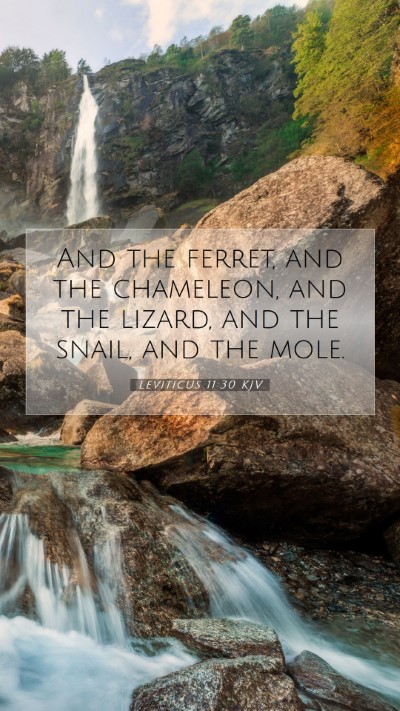Bible Verse Commentary: Leviticus 11:30
Verse Reference: Leviticus 11:30 - "And the large lizard, the gecko, the monitor lizard, the sand lizard, and the chameleon." (ESV)
Introduction
This verse is part of a larger section in the book of Leviticus, which details dietary laws and regulations for the people of Israel. Understanding Leviticus 11:30 requires an examination of its historical context, significance in the holiness code, and its applications. Below, we analyze the verse through insights drawn from established public domain commentaries.
Commentary Insights
- Matthew Henry: Henry refers to the categorization of these creatures as part of the larger dietary restrictions outlined in Leviticus. He emphasizes that these laws served to distinguish the Israelites from other nations, marking them as a holy people unto God. He notes that the inclusion of specific reptiles like lizards illustrates God’s concern with not only what is eaten but also with holiness in everyday life.
- Albert Barnes: Barnes highlights the significance of the "unclean" status assigned to these lizards. He explains that, culturally and spiritually, these animals represented a departure from the clean and pure elements that God desired from His people. His commentary reinforces the idea that understanding such laws provides deeper insight into the nature of God’s expectations for moral and spiritual cleanliness.
- Adam Clarke: Clarke offers a more detailed exploration of the types of lizards listed, suggesting that they are all adaptable and survive in diverse environments, yet are deemed unclean for the Israelites. He points out that the reasons behind these classifications are often related to symbolism and lessons about obedience, reinforcing the moral code that separates holiness from the common or impure.
Understanding the Historical Context
The laws in Leviticus are ancient regulations provided to the Israelites as they settled into the Promised Land. In this context, the mention of various reptiles can be understood not merely as dietary restrictions but also as part of a broader theological narrative. These laws served to teach the Israelites about God's holiness and the importance of living a distinctive lifestyle.
Symbolism and Application
The various creatures listed in this verse symbolize more than their physical characteristics; they reflect the broader spiritual principles of purity and cleanliness that were crucial in Israelite society. The command to refrain from eating these lizards could be seen as an invitation to pursue holiness in all aspects of life.
Spiritual Lessons
- Separation from Impurity: The dietary laws emphasized a separation from what is deemed unclean or impure. In a modern application, this can be reflected in how individuals choose to engage with the world around them, promoting a lifestyle that honors God's standards.
- Holiness unto God: The laws outline an expectation of living in a way that is representative of being set apart for God's purposes. This encourages believers to consider their actions, choices, and allegiances, striving for a life of holiness.
Cross References
- Deuteronomy 14:19: A similar list of unclean creatures.
- Isaiah 66:17: A prophecy regarding those who eat unclean things.
- Matthew 15:11: Jesus' teaching on what defiles a person.
Conclusion
Leviticus 11:30, while referring to specific reptiles, encapsulates a broader teaching about separation, holiness, and the nature of God’s covenant with His people. Understanding this verse invites deeper reflection on the principles of Biblical exegesis and its implications for modern believers. For anyone engaging in Bible study groups or seeking Bible study insights, these verses serve as a foundational example of God's design for purity in life and worship.


